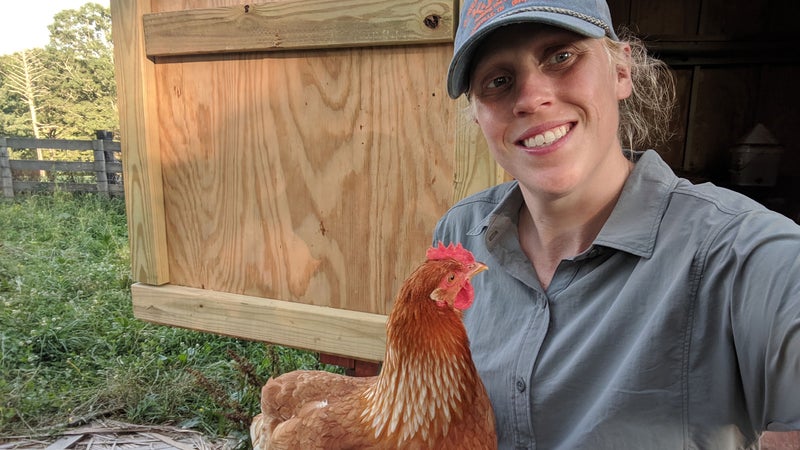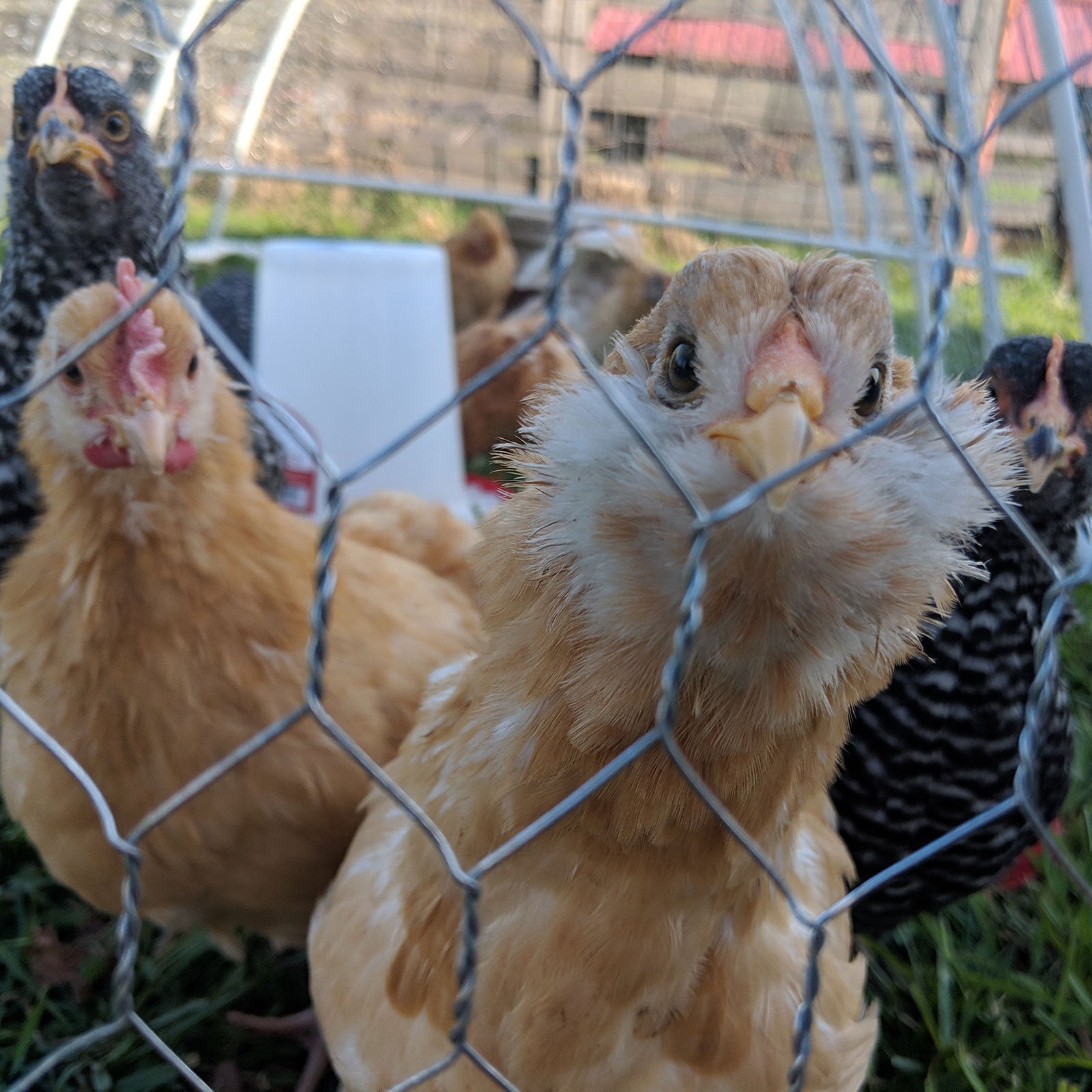My name is AC, and I’m obsessed with my chickens. This is not hyperbole. I’ve done everything you’re not supposed to do with livestock.��I’ve named them, brought them into my house, and despite the Centers for Disease Control and Prevention’s warnings not to, I have definitely cuddled with them. In other words: I’ve turned them into pets.
I have no regrets.
I’ve spent the last four years trying to grow as much of my food as possible from my own yard. Plucking my own vegetables also feels like a small way to combat climate change. Grown here, not flown here, I smugly say as I bite into a just-off-the-vine cucumber.
But to truly eat from within my property lines, I needed protein, too. Laying hens seemed like a natural place to start. (FYI, hens are the girls, roosters are the boys, and all together they’re chickens.) I Googled “laying hens for sale,” placed an order,��and��for the past seven months, I’ve had��a backyard full of 28 happy, floofy, and totally ridiculous chickens.
I did not set out to have a small army of birds. But the first thing you need to know about owning these creatures is that there’s something called chicken math. This is a poultry-based equation where, no matter how you work it, you always end up with more birds than intended. I now have enough chickens to put together a college a capella group.
Not all chicks��survive to��become hens, so I ended up ordering more than expected, but that’s OK,��because they are a delight.��Every single one of my girls has a different personality. Ruth Bader Ginsbird is thoughtful and unflappable. Chicki Minaj is all attitude, all the time. SusHen B. Anthony is an absolute chowhound and will come running (well,��waddling) if she thinks I may have snacks. They jump in my lap, eat strawberries from my hand, and one, who I call Snuggle Chicken, would��rather be tucked under my arm than anywhere else. Yes, technically these are tiny dinosaurs, and I have no doubt they’d eat me if I collapsed in the chicken yard. But they’re also funny, sweet, and social, and I’m surprised by how attached I am to all of them.
You, too, can become chicken obsessed—if your municipality allows it. (And it may not, because like , chickens��are loud and clueless about reading a room.) However, these birds require a serious commitment, like all animals, and it’s only fair to do your research before taking them on. Here’s what I’ve learned.

There’s a Lot of Butt Stuff
When your chicks arrive, you’ll have to check them for something called pasty butt. This is when poop literally crusts over their butt (called a vent, on a chicken). If not wiped clean, it will kill them.
Cleaning up this condition requires holding a thrashing and screaming chick, running its backside under warm water, massaging the poop off with your fingers, and then blow-drying that fuzzy rear end. Just get over the ick factor.
You’d think you’d be done with the butt stuff once the chicks��become adults, but you’re not. Recently, one of my brood had the symptoms of being egg-bound,��a condition in which��a hen’s egg gets stuck on its��way out into the world. I donned a latex glove, lubed up my index finger, and gently reached in to see if indeed something was stuck. (I��got the egg out with minimal fuss, and she’s doing much better, thank you for asking.)
The Circle of Life Isn’t a Circle
A chicken’s life is much more unpredictable than you’d expect, less a circle than a crooked hexagon drawn by a toddler.
Some of your chicks won’t make it through their first week of life. Baby chicks are delicate, and some die for no real reason beyond failure to thrive.��Like many domesticated animals, we’ve bred chickens to be either really meaty or prodigious egg layers. Tolerance to life’s cruelties isn’t a trait we’ve encouraged, and as a result, chickens are somewhat prone to a range of maladies, many of which are fatal.
The best piece of advice I ever got from a fellow farmer is that if you have livestock, you’ll someday have dead stock. Sometimes that day is sooner than you think. Sometimes you have to be the one to assist them into the next world by kindly putting them out of their misery. Sometimes you try your best to save them, but it’s not enough. It is hard, and you will always feel a little sad. But that’s what makes a good farmer—or chicken keeper.
Roosters Are Kind of the Worst
You do not need a rooster for your hens to produce eggs. And the myth about hens being more productive with a rooster around is just something men have made up to make themselves feel more useful, I think. The ladies are just fine all on their own.
I do have a rooster, but he’s there for one reason only: babies. And honestly, he’s a jerk. Get too close and he’ll fight you. Before he got mean, we named him Daddy Warclucks. Now��I’m constantly walking around��fighting him off me and the hens��and shouting, “Bad, Daddy, bad!”��It’s…��not great.
Backyard Birds Will Ruin Factory Farming for You
According to research done by the��, 47 percent of Americans support a ban on factory farming. However, the vast majority of animal products in this country are produced in CAFO, or concentrated animal feeding operations. (The Sentience Institute estimates that 99 percent of our animals are kept this way, though other sources put this��number lower.)
The bottom line: there’s a disconnect between how we think and how we shop. Having your own birds, however, will connect the two in a way you cannot ignore.��Hens are curious, creative, and funny. They’re incredibly social, and, like humans, can toggle between being sweet and being assholes with their companions.
Owning backyard hens will make you lament the way most commercial chickens are raised in the U.S.: in indoor barns with little space. Many have to have their��beaks removed, too, since��in confinement, they tend to become aggressive, and those beaks can do real harm. I try not to tell people how they should or should not eat. Food is an incredibly personal choice. But personally, my relationship with factory-farmed poultry is over.
Chickens, Like All Animals, Can Be Gross
OK, they poop, that’s expected. And there’s the aforementioned butt stuff. But chickens can also be plagued by lice, mites, and—wait for it—bedbugs. Yes, your birds can get bedbugs. I haven’t experienced any of these horrors yet, but I’m sure the day is coming.
Chickens also sometimes pick on each other. Once a hen starts bleeding, the other hens may join in and keep pecking at her wound. You’re also not supposed to feed your chickens raw meat, because��apparently—although I have not tried this to verify it—it could encourage cannibalism.
Basically: these are tiny dinosaurs you are raising. Dinosaurs weren’t known for being all chill vibes all the time. Keep that in mind.
These Will Be the Most Expensive Eggs Ever
The economics of raising your own eggs only works if��you do it for years and years in the same building, with babies raised from your previous generations. I spent a couple hundred dollars on my starter flock, a couple hundred more on its��coop, and each bag of organic feed sets me back another $20. Eggs at the store, meanwhile, are often as cheap as $1 per dozen. It��will take years to make that math work.
Right now��each of my hens lays four to five��eggs a week (though I have one rock star who lays pretty much daily). They’ll lay at that rate for a couple of years, and then they’ll slow down. Egg production can lag, and sometimes stop, in the winter and when they molt, which happens a few times throughout their lives. So I get enough eggs that I never have to buy them, and I have a few dozen extra every week to sell.
This is never really going to be a money-saving or moneymaking endeavor. The economics of scale are just not on your side. However, having a chicken hop in your lap or come running in hopes of scoring a treat is its own reward.


